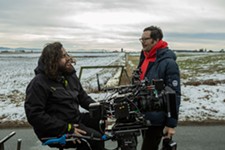Fantastic Fest 2015: Zinzana
How to make a nation's first genre film
By Richard Whittaker, 8:40PM, Mon. Sep. 28, 2015
If you don't know much about the cinema of the United Arab Emirates, it's not surprising. But Zinzana (aka Rattle the Cage), the whip-smart sealed room noir with a deliciously black sense of humor, could change all that.
Set across one day in a tiny rural police station, the debut feature from director Majid Al Ansari pits two of the region's most famous actors against each other. Zinzana translates literally as cell, and behind the bars is Talal (Saleh Bakri), in on a drunk-and-disorderly charge. Outside is Dabaan (Ali Suliman), a charming cop with a serious secret to keep. Their interaction quickly becomes a game of cat and mouse, with Talal trying to keep himself and anyone else that wanders into the station safe from the diabolical and dashing Dabaan.
For years, cinema in the region was dominated by Egyptian films and Egyptian distributors. As the single biggest market, it had a stanglehold, often making sure that movies from other nations (especially ones in which they were not investors) would rarely be given a chance to break out. But now the UAE is expanding and thriving, its population swelling and, with that growth, it now has the greatest numbers of screens in the Arabic world.
That's why Al Ansari called Zinzana "bigger than itself as just one film. It's a movement that's just starting." With the backing of production company Image Nation, he and his fellow filmmakers (including producer Rami Yasin) are hoping to give UAE audiences a different kind of homegrown movie, a change from the domestically produced dramas that dominate local screens, and a local alternative to the international blockbusters. He said, "We don't have the market, but we are building it. We may not get the box-office hit now, but in the future, when you're 15, 20 films in, then you'll start gaining your money, then you'll start stabilizing the industry there."
Austin Chronicle: The United Arab Emirates is a nation that a lot of people don't know much about, and they know even less about its film industry.
Majid Al Ansari: Back in the Fifties and Sixties, we were a very simple, simple, simple people, living in mud houses and tents. So when the oil boom hit, and we have a great government, it's all about sharing, so the wealth got shared with the people, and shared with the community. So going from that, and getting into arts, it took a long time. It's something that's not necessary, it's a luxury to have. And when you're stable, the arts become something you can get into. So the art forms, filmmaking, music, and so on, didn't really start flourishing until 10 years ago, 15 years ago. Because of that background, the film watchers we have in the region are so used to American blockbusters because that's the films that come there: The Avatars, the Mission: Impossibles.
Of course, we have Arabic films, but [audiences] look at it as a movie, just straight up, like that. So what we did was to be very economical and very smart, but deliver something that really instills that belief that, yes, Arab cinema can be as good as the West. It could be something that's entertaining, it could be something that you watch, and it's fun, and you eat your popcorn, and you could take your family - well, not with our film.
Going back to the question of how it is for filmmakers, it's not easy. It's not like you have an opportunity where you can work with many students, and there's agents and a lot of talent. It's not like that, but it's a family. With Rami, with me, with [Abu Dhabi-based production house] Image Nation, with [executive producer] Ben Ross, we are all fighting and we're all working for the bigger picture of the cinema in our region.
Rami Yasin: We're building a lot of community. We're not only building up directors, we're building up directors, producers, first ADs that can work on this new level. We've just finished a movie with an ensemble cast of 13 characters, and they're like, 'Thank you so much!' Apart from the fact that the story's great and we get to do this work that we dream of doing, that we see other actors doing and never get the chance to do that ourselves, it's the way that we get treated and the way this whole production is set up. It feels like the real thing.
AC: Zinzanna is such a sealed room drama. The camera only leaves the police station once, always either on Talal or Dabaan.
MAA: One of the reasons I wanted to do this was because it was a container film. I was watching Phone Booth and I was watching Panic Room, and any container that's done well is done well because it's planned. As a first-timer, I think it would be an accomplishment to make a container film, because everyone would expect it would be basic. But I wanted it to make it as kickass as possible, and having this restriction would only mean you have to find creative ways of making it fast or making it slow or making it tense. We did a lot of planning to shoot in that space, and if this was the location, I literally divided it into squares, and planned from scene one to the end of the film to make sure we don't repeat shots, that it's very interactive. It's in the same space, but it looks new. It's in the same space, but it feels like a new location.
Another method I wanted to use is that I wanted the free camera. Even though it's a container film, the location would never dictate my camera. It would flow wherever it wants. Through bars, through the sprinkler, go through the wall.
RY: It's the only free character in the film.
Zinzana screens again Tuesday, Sept. 29, 11:30am.
For more Fantastic Fest news, reviews, and interviews, follow all our updates at www.austinchronicle.com/fantastic-fest.
A note to readers: Bold and uncensored, The Austin Chronicle has been Austin’s independent news source for over 40 years, expressing the community’s political and environmental concerns and supporting its active cultural scene. Now more than ever, we need your support to continue supplying Austin with independent, free press. If real news is important to you, please consider making a donation of $5, $10 or whatever you can afford, to help keep our journalism on stands.
Richard Whittaker, July 31, 2018
Richard Whittaker, April 20, 2018
Richard Whittaker, Oct. 23, 2015
Richard Whittaker, Oct. 7, 2015
July 12, 2024
July 12, 2024
Fantastic Fest, Alamo Drafthouse, Alamo South Lamar, Zinzana, Fantastic Fest 2015













